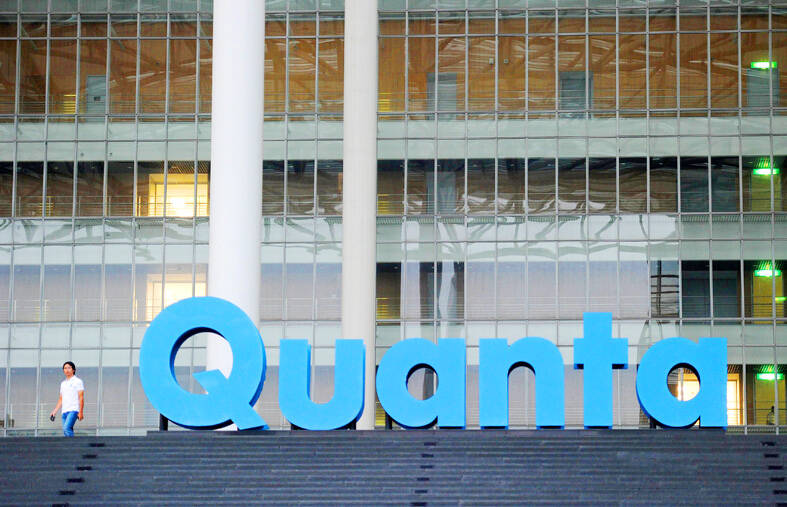Quanta Computer Inc (廣達電腦), one of the world’s leading contract notebook computer makers, yesterday reported that its net profit last month was flat from a year earlier at NT$3.87 billion (US$123.44 million), but totaled nearly 60 percent of the profit it made in the first quarter.
The company earned NT$1 per share last month, while revenue declined 27.1 percent year-on-year to NT$90.18 billion, Quanta said in a filing with the Taiwan Stock Exchange.
In the first quarter, Quanta’s net profit decreased 4 percent year-on-year to NT$6.47 billion, with earnings per share of NT$1.68, while revenue fell 12 percent to NT$266.18 billion, it said.

Photo: Sam Yeh, AFP
Quanta, also a major artificial intelligence (AI) server maker, released its earnings and revenue data at the request of the stock exchange regulator due to an unusual spike in its stock price.
Its shares surged 10 percent to close at NT$248.5 in Taipei trading yesterday, the highest in 23 years.
They have jumped 243.71 percent since the beginning of the year, as investors expect the firm, along with several other local computer hardware makers, to benefit from the increase in AI server adoption by US cloud service providers, such as Microsoft Corp, Amazon.com Inc and Alphabet Inc’s Google.
Yuanta Securities Investment Consulting Co (元大投顧) yesterday forecast that Quanta would secure a share of up to 25 percent of the global AI server market this year, with shipments of 43,000 units.
Shipments next year would likely rise to 99,000 units, Yuanta said in a note, adding that as the average selling price of AI servers is much higher than that of traditional servers, they would significantly contribute to Quanta’s revenue.
Yuanta predicted that Quanta’s AI server sales would grow 139 percent year-on-year to NT$160 billion this year, and increase 129 percent to NT$366.4 billion next year, contributing to 13 percent and 22 percent of the firm’s total sales over the period respectively.
Quanta’s revenue growth would also be driven by its automotive products, such as electronic control units, center consoles, in-vehicle entertainment devices and advanced driver-assistance systems, which have cut into tier-1 supply chains in the US, Europe, and Japan, Yuanta said.
The consultancy estimated that Quanta’s sales in the auto sector would grow 18 percent year-on-year this year and increase 51 percent annually next year.
Given the positive long-term growth outlook for automotive and server demand, Yuanta raised its 12-month target price on Quanta to NT$300, the note said.

CHIP WAR: Tariffs on Taiwanese chips would prompt companies to move their factories, but not necessarily to the US, unleashing a ‘global cross-sector tariff war’ US President Donald Trump would “shoot himself in the foot” if he follows through on his recent pledge to impose higher tariffs on Taiwanese and other foreign semiconductors entering the US, analysts said. Trump’s plans to raise tariffs on chips manufactured in Taiwan to as high as 100 percent would backfire, macroeconomist Henry Wu (吳嘉隆) said. He would “shoot himself in the foot,” Wu said on Saturday, as such economic measures would lead Taiwanese chip suppliers to pass on additional costs to their US clients and consumers, and ultimately cause another wave of inflation. Trump has claimed that Taiwan took up to

A start-up in Mexico is trying to help get a handle on one coastal city’s plastic waste problem by converting it into gasoline, diesel and other fuels. With less than 10 percent of the world’s plastics being recycled, Petgas’ idea is that rather than letting discarded plastic become waste, it can become productive again as fuel. Petgas developed a machine in the port city of Boca del Rio that uses pyrolysis, a thermodynamic process that heats plastics in the absence of oxygen, breaking it down to produce gasoline, diesel, kerosene, paraffin and coke. Petgas chief technology officer Carlos Parraguirre Diaz said that in

SUPPORT: The government said it would help firms deal with supply disruptions, after Trump signed orders imposing tariffs of 25 percent on imports from Canada and Mexico The government pledged to help companies with operations in Mexico, such as iPhone assembler Hon Hai Precision Industry Co (鴻海精密), also known as Foxconn Technology Group (富士康科技集團), shift production lines and investment if needed to deal with higher US tariffs. The Ministry of Economic Affairs yesterday announced measures to help local firms cope with the US tariff increases on Canada, Mexico, China and other potential areas. The ministry said that it would establish an investment and trade service center in the US to help Taiwanese firms assess the investment environment in different US states, plan supply chain relocation strategies and

Japan intends to closely monitor the impact on its currency of US President Donald Trump’s new tariffs and is worried about the international fallout from the trade imposts, Japanese Minister of Finance Katsunobu Kato said. “We need to carefully see how the exchange rate and other factors will be affected and what form US monetary policy will take in the future,” Kato said yesterday in an interview with Fuji Television. Japan is very concerned about how the tariffs might impact the global economy, he added. Kato spoke as nations and firms brace for potential repercussions after Trump unleashed the first salvo of